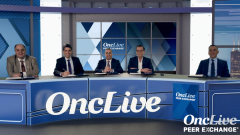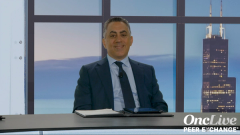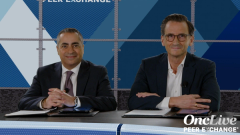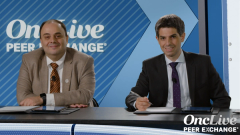
Management of HCC: Advances in Biomarkers and Screening
A brief review of predictive and prognostic biomarker needs in hepatocellular carcinoma, followed by discussion on screening and detection.
Episodes in this series

Transcript:
Tanios Bekaii-Saab, MD: Anthony, here at ASCO [American Society of Clinical Oncology Annual Meeting], everything is about biomarkers. Every disease is moving into the biomarker space to select therapy, to select patients for the right therapy. What’s going on in HCC [hepatocellular carcinoma]?
Anthony El-Khoueiry, MD: A lot in the research realm, but nothing that impacts clinical care. That’s the short answer.
Tanios Bekaii-Saab, MD: Are there any promising biomarkers that you would bet on? Is there 1 I want to integrate in my next-phase, randomized clinical trial?
Anthony El-Khoueiry, MD: A lot of drug development in HCC is immunotherapy based. Finding predictive markers in immunotherapy has been a challenge across diseases in general. If we look at PD-1 and PD-L1 expression across recent studies in HCC, including phase 3, you notice that the responses are occurring despite PD-L1 being positive or negative, but the PD-L1–positive patients have a slightly higher chance of responding. It could be an enrichment strategy as part of an overall strategy, but it’s not a predictive marker. There are data evolving about CD8 and CD3 T-cell infiltration associated with outcome, like in other tumor types, if the right cells are in the tumor microenvironment.
Tanios Bekaii-Saab, MD: This appears to be mostly prognostic.
Anthony El-Khoueiry, MD: Correct. They tend to do better. There are some immune or inflammatory signatures picked up that consistently show association with multiple end points, including response and survival, including from CheckMate 459, the largest study to report biomarkers. Some of these immune signatures could be taken forward and validated a bit more and may become a part of selection strategy.
Tanios Bekaii-Saab, MD: We’re getting closer, but we’re not there yet.
Anthony El-Khoueiry, MD: Correct.
Tanios Bekaii-Saab, MD: Closing this margin. Pierre, moving to the earlier stages, to screening and early detection, what’s happening? We keep hearing about platforms that are being looked at, with unmethylated and methylated DNA biomarkers. They look promising compared with other alpha-fetoproteins [AFPs]. What’s moving in that front?
Pierre Gholam, MD: A lot of these platforms focus on finding suitable alternatives to our already-established screening methods. But in fact, the focus should be how we can augment our screening strategies to make screening more effective and higher yield. I hope the folks who already have products on the market are interested in expanding the use, and maybe take this to heart and start developing products that fill that bill. We don’t have any evidence, although studies—some of which we’re participating in—are ongoing.
These platforms seem to have a sensitivity and specificity that approach or slightly improve upon our established screening criteria for at-risk groups—basically, ultrasound imaging or in people who do this ultrasound combined with alpha-fetoprotein. There are limited studies looking at other markers, which over time have been used to enhance screening efficacy, including AFP-L3 [third electrophoretic form of lentil lectin-reactive AFP], DCP [des-γ-carboxy prothrombin], and things like that. It doesn’t look like that adds a tremendous amount in Western patients. In Eastern and Asian patients, for some reason these tend to be much higher yielding than in our Western patients, probably related to disease etiology and other factors.
Tanios Bekaii-Saab, MD: We’re not there, but there’s quite a bit of movement in that space.
Arndt Vogel, MD: We need something. One paper about the underlying causes of HCC, and NAFLD [nonalcoholic fatty liver disease] was 1 of the fastest-growing reasons for HCC. For this population, we need a screening strategy. We see more patients with obesity and diabetes, which are difficult for ultrasound and to scan the liver completely. We need new screening tools that are low risk.
Tanios Bekaii-Saab, MD: Yes, absolutely.
Transcript edited for clarity.







































